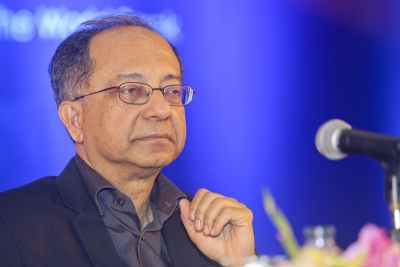Top News
10% per cent quota law unwanted, will achieve close to nothing: Kaushik Basu

Kolkata, Jan 14 (IANS) The new law providing 10 per cent reservation to economically weaker general category people in education and government jobs was “unwanted” and it could achieve “close to nothing” former Chief Economic Adviser to the Union finance ministry, Kaushik Basu, said here on Monday.
“It was an unwanted legislation and it is a disappointing move. It will achieve close to nothing and will create a cumbersome procedure. The way the law is brought in is that 10 per cent of jobs is reserved virtually for everyone (every household),” he said at the launch of his book ‘The Republic of Beliefs’, here at a programme organised by Indian Chamber of Commerce.
President Ram Nath Kovind has approved a constitutional amendment that provides 10 per cent reservation to economically weaker general category people in education and government jobs.
The Constitution (One Hundred and Third Amendment) Act, 2019 was passed by Parliament on the last day of the winter session last week with daylong discussions and voting in both Houses.
The 10 per cent quota is in addition to the 22.5 per cent reservation for Scheduled Castes and Scheduled Tribes and 27 per cent reservation for castes identified as the Other Backward Classes (OBC). The fresh provision does not tinker with the existing 49.5 per cent of this quota.
Basu, former World Bank Chief Economist, explained that the way the legislation came into force was that the 10 per cent jobs are being reserved for households with less than Rs 8 lakh income per annum.
“By most calculations, somewhere between 96-99 per cent of Indian households fall into that category,” he said.
However, Basu said introduction of the Insolvency and Bankruptcy Code was a good move.
“IBC is a very good news and a much-needed law,” he said.
Citing his experience in World Bank, he said in terms of ease of doing business, one indicator on which India did not do well was related to “closing of business”.
One tends to hesitate to start business if one thinks that exit from it could be difficult if anything goes wrong, he explained.
Basu said Goods and Services Tax (GST) was badly needed and as an idea, it was “important” but “poorly implemented”.
Small businesses were badly hit by GST, he said.
— IANS
bdc/ssp/prs
Entertainment
Casino Days Reveal Internal Data on Most Popular Smartphones

International online casino Casino Days has published a report sharing their internal data on what types and brands of devices are used to play on the platform by users from the South Asian region.
Such aggregate data analyses allow the operator to optimise their website for the brands and models of devices people are actually using.
The insights gained through the research also help Casino Days tailor their services based on the better understanding of their clients and their needs.
Desktops and Tablets Lose the Battle vs Mobile
The primary data samples analysed by Casino Days reveal that mobile connections dominate the market in South Asia and are responsible for a whopping 96.6% of gaming sessions, while computers and tablets have negligible shares of 2.9% and 0.5% respectively.
The authors of the study point out that historically, playing online casino was exclusively done on computers, and attribute thе major shift to mobile that has unfolded over time to the wide spread of cheaper smartphones and mobile data plans in South Asia.
“Some of the reasons behind this massive difference in device type are affordability, technical advantages, as well as cheaper and more obtainable internet plans for mobiles than those for computers,” the researchers comment.
Xiaomi and Vivo Outperform Samsung, Apple Way Down in Rankings
Chinese brands Xiaomi and Vivo were used by 21.9% and 20.79% of Casino Days players from South Asia respectively, and together with the positioned in third place with a 18.1% share South Korean brand Samsung dominate the market among real money gamers in the region.
Cupertino, California-based Apple is way down in seventh with a user share of just 2.29%, overshadowed by Chinese brands Realme (11.43%), OPPO (11.23%), and OnePlus (4.07%).
Huawei is at the very bottom of the chart with a tiny share just below the single percent mark, trailing behind mobile devices by Motorola, Google, and Infinix.
The data on actual phone usage provided by Casino Days, even though limited to the gaming parts of the population of South Asia, paints a different picture from global statistics on smartphone shipments by vendors.
Apple and Samsung have been sharing the worldwide lead for over a decade, while current regional leader Xiaomi secured their third position globally just a couple of years ago.
Striking Android Dominance among South Asian Real Money Gaming Communities
The shifted market share patterns of the world’s top smartphone brands in South Asia observed by the Casino Days research paper reveal a striking dominance of Android devices at the expense of iOS-powered phones.
On the global level, Android enjoys a comfortable lead with a sizable 68.79% share which grows to nearly 79% when we look at the whole continent of Asia. The data on South Asian real money gaming communities suggests that Android’s dominance grows even higher and is north of the 90% mark.
Among the major factors behind these figures, the authors of the study point to the relative affordability of and greater availability of Android devices in the region, especially when manufactured locally in countries like India and Vietnam.
“And, with influencers and tech reviews putting emphasis on Android devices, the choice of mobile phone brand and OS becomes easy; Android has a much wider range of products and caters to the Asian online casino market in ways that Apple can’t due to technical limitations,” the researchers add.
The far better integration achieved by Google Pay compared to its counterpart Apple Pay has also played a crucial role in shaping the existing smartphone market trends.
Content provided by Adverloom













